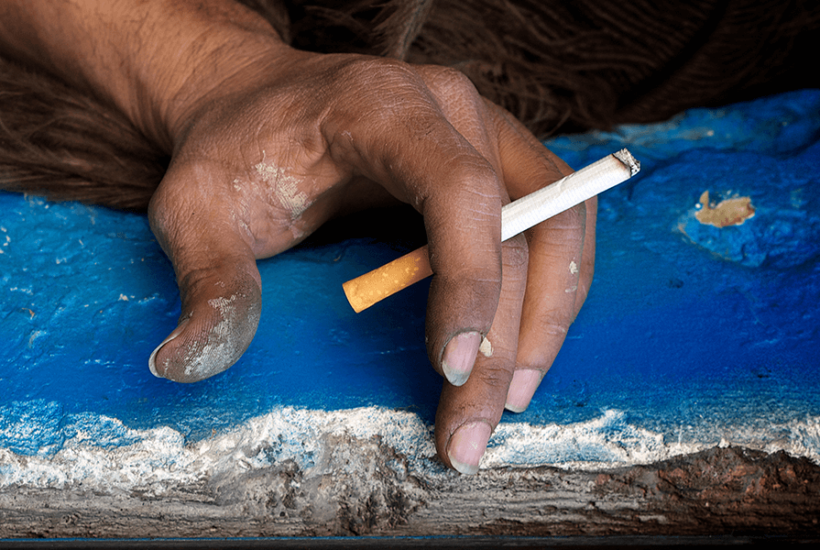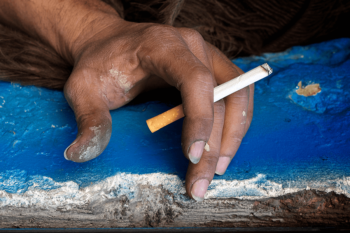Preventing young Aboriginal people from starting to smoke

Status completed
Start Date
End Date
This project focused on priority areas as identified by stakeholders. It worked in collaboration with stakeholders to produce findings that are meaningful and actionable for both government and non-government organisations including the Aboriginal Community Controlled Health Sector when developing new programs.
Introduction
The project provided the evidence to Aboriginal Community Controlled Health Services for designing programs that reduce smoking by tackling the broader determinants of tobacco use, embedding culture and community connections, and improving health in a holistic way.
About
Understanding what influences smoking initiation for young Aboriginal and Torres Strait Islander people and identifying opportunities for prevention
Project titleWhat is the issue?
Australia is a world leader in tobacco control. Our comprehensive approach of the past decades has resulted in significant declines in adult smoking rates in the Australian population, including for Aboriginal and Torres Strait Islander people, demonstrating change is possible.
Analysis of smoking trends by the Australian Bureau of Statistics found that between 1994 and 2014–15, the proportion of Aboriginal and Torres Strait Islander people who smoked declined from 55% to 45%, although most of these declines were in non-remote areas. Youth smoking rates also declined significantly over this period, with only 17% of young Aboriginal and Torres Strait Islander people aged 15–17 smoking in 2014–15, compared to 30% in 1994. More young people are now identifying as never smokers.
Although the declining rates show a very positive longer-term trend, smoking continues to be the single largest contributor to the gap in disease burden between Aboriginal and non-Aboriginal people, with adult smoking rates almost three times higher. As most smoking commences in adolescence, reducing smoking initiation among young people is critical to reducing the overall smoking prevalence, in combination with efforts to support smoking cessation among established smokers.
If we can understand what has influenced the increase in never smoking among Aboriginal and Torres Strait Islander young people, we will be able to inform the design of more effective prevention programs into the future.
How did the project address the issue?
This multi-component PhD project explored trends in smoking initiation and non-smoking experiences of Aboriginal and Torres Strait Islander adolescents (10–24 years). It identified the protective individual, social, cultural and environmental factors that influence them to grow up, and stay, smoke-free, and how this varies between groups based on age, location and attitudes/beliefs.
This research program was conducted within the broader Prevention Centre research project, A Comprehensive Approach to Aboriginal and Torres Strait Islander Tobacco Control.
It consisted of:
- A systematic review of individual, social, cultural and environmental factors that influence smoking among Indigenous adolescents aged 10–24 years living in Australia, New Zealand, Canada and the United States.
- Quantitative analysis of the ABS Aboriginal and Torres Strait Islander Health and Social Surveys (NATSIHS, NATSISS) to explore changes in the age young Aboriginal and Torres Strait Islander people started smoking between 2002 and 2015.
- Quantitative analysis of the Australian Secondary Students’ Alcohol and Drug survey (ASSAD) to explore trends in smoking prevalence among Aboriginal and Torres Strait Islander students and relationship to other substance use between 2005–2017
- Quantitative analysis of data from the Study of Environment on Aboriginal Resilience and Child Health (SEARCH) to identify factors associated with non-smoking among Aboriginal adolescents living in urban and regional New South Wales.
- Qualitative research with Aboriginal adolescents in the SEARCH cohort to explore their stories, attitudes and experiences of non-smoking and to triangulate findings from the quantitative analysis.
What was the relevance for practice?
This project focused on priority areas as identified by stakeholders. It worked in collaboration with stakeholders to produce findings that are meaningful and actionable for both government and non-government organisations including the Aboriginal Community Controlled Health Sector when developing new programs.
The findings will assist the tobacco control sector to maximise the effectiveness of their youth-targeted projects, in line with the NTS and NATSHIP, and give funding bodies confidence to invest in these types of interventions through an increased understanding of the influences and needs of young Aboriginal and Torres Strait Islander people.
What were the outcomes?
Aboriginal Community Controlled Health Services have the evidence needed to design programs that reduce smoking by tackling the broader determinants of tobacco use, embedding culture and community connections, and improving health in a holistic way.
Acknowledgement
Advisors for this PhD project:
Richard Chenhall, University of Melbourne
Nicola Guerin, Cancer Council Victoria
Lina Gubhaju, University of Melbourne
Publications
Other publications
- Heris C, Thurber K, Wright D, Thomas D, Chamberlain C, Gubhaju L, Sherriff S, McNamara B, Banks E, Smith N, Eades S. Staying smoke‐free: Factors associated with non‐smoking among urban Aboriginal adolescents in the Study of Environment on Aboriginal Resilience and Child Health (SEARCH). Health Promotion Journal of Australia. 2020 Oct 9. do: 10.1002/hpja.430
Presentations
- 2017 Oceania Tobacco Control Conference
- 2018 Public Health Prevention Conference
- 2018 Australian Public Health Conference
- 2018 Adolescent Health Conference
- 2019 Health Promotion conference, NZ
People
Lead investigators
-
Dr Christina Heris Dr Christina Heris has finished working with the Prevention Centre.
University of Melbourne




